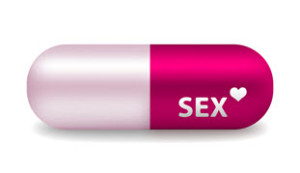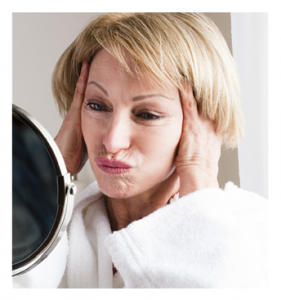I’ve been wondering about the sex pill for women for several years now, or rather, the absence of any erotic elixir — a little pink pill — to prop up flagging female sexual desire. After all, the guys are armed to battle erectile dysfunction and low T, but where’s my sexy cocktail to amp up my amorous outlook?
 What are a woman’s safe and effective options if we find we aren’t in the mood, and we’d like to be?
What are a woman’s safe and effective options if we find we aren’t in the mood, and we’d like to be?
Ah yes, Sprout Pharmaceuticals to the rescue! They’ve been in the news recently as they attempt (a third time) to secure FDA approval of flibanserin, their proposed treatment for low sexual desire in women.
No Pills for Social-Sexual Ills?
I’m uncertain whether to laugh or cry at this entire debate. Perhaps I’ll need to do a bit of both. I certainly nod when I read columns such as this, written by Jessica Valenti: “If a Woman Isn’t Interested in Sex, the Problem Quite Possibly Isn’t With Her“, in which the culprits in low female desire include — and I’m paraphrasing — her partner’s lack of foreplay, her partner’s laziness, and familiarity.
She writes:
… there’s no pill that will make more men interested in foreplay, abandon whatever bad habits they picked up from online porn or make them decide that they’re willing to really try that thing women like… There’s no pill that will reverse what several studies show is a distinct correlation between the time a woman’s been with a man and how much she still wants to have sex with him… No little pink pill will magically make individual men better – or at least less lazy – at sex.
I get it. Lots of us get it.
Or rather, we don’t.
While she does not deny the reality of physiological changes that make sex less pleasurable for some women, Ms. Valenti is pointing the spotlight on social, psychological and behavioral factors relative to male-centered views of sexuality in general, and our partners in particular.
She reminds us:
Without female-friendly sexuality taught in schools, or female-centered desire portrayed in media… it’s easy to see why so many people would want to believe that taking a pill will fix the problem.
I want women to feel more desire – a lot of desire! But medicalizing what seems to be an overwhelmingly social rather than physical problem because it’s easier than dealing with the messy, complicated world of authentic female sexuality… well, there’s just no pill for that one…
I agree with those remarks. However, Ms. Valenti is 36 years old. And I’ll come back to the relevance of that in a moment.
Equal Opportunity Arousal?
Another opinion piece, also “con,” appears in The New York Times, written by sex educator Emily Nagoski. “Nothing Is Wrong With Your Sex Drive” focuses on “spontaneous” versus “responsive” desire, not to mention whether or not we should be prescribing for what is “normal.”
Please pass the latest DSM. Oh, and maybe an infographic with a nice Bell Curve. And a Bloody Mary. This handling of delicate subject matter is making me depressed, agitated, anxious, and I know we have pills a-plenty for that.
Don’t I know my own “normal?” Aren’t I — and my partner — the best judges of that? Isn’t this true of every couple? Why do I think Ms. Nagoski hasn’t hit the half century mark just yet?
Ms. Nagoski explains the flibanserin situation as follows:
The F.D.A. has rejected it [flibanserin] twice already, and will most likely reject it a third time because (if you’re Sprout) the F.D.A. is sexist or (if you’re the F.D.A.) the drug doesn’t work and isn’t safe.
As a woman of a certain age (as the French like to say), and noting my own relative lack of oomph in recent months, I’m hard-pressed to know what is physical (including fatigue) and what is psychological. Yet I can’t help but see the validity in both elements of the statement above. Surely the lack of options for women is a sign of a deeply sexist society (no news there), and yes, I worry about the safety and effectiveness of any med or supplement I ingest.
Thanks for nothing, Big Pharma.
 But why do the men get their boost — safely — and the women, not so much?
But why do the men get their boost — safely — and the women, not so much?
Sexuality Is Complicated
Here’s the problem I have with this entire discussion.
These aren’t purely health issues. These aren’t purely relationship issues. These are matters that reflect a strangely ambivalent and contradictory society when it comes to female sexuality. So Ms. Valenti gets that right.
And then there’s this, of particular relevance to my demographic as our hormonal stores are dwindling: We’re struggling to compete for men our own age, limbering up to keep them interested, and doing so in the wake of wearying “first lives” in which we cared for husbands, children, and were frequently holding down demanding outside jobs.
Meanwhile, we’re supposed to be fab at fifty, learning to lean in, eagerly entrepreneurial, sexually adventurous, and oh by the way — look great as we’re doing it! All of it! Never mind that we may tending to our aging parents and still supporting college kids or young adults unable to find work.
Might we raise a (red) flag to “impossible expectations?” Can we admit (at least) to being exhausted?
And when we’re tired, we’re stressed, we’re juggling too much — all Christian Grey antics aside — wouldn’t we prefer sleep to sex? Haven’t studies shown precisely that?
Now, I’m a fan of Ms. Valenti’s writing and, more often than not, her views. But I doubt the largest target market for the female sex pill is her demographic, and truthfully, it is mine. Our bodies change, and for some of us, those changes are challenging. Something to help — when it seems as if an essential piece of who we are is MIA — would be welcome. This is especially the case if our partners, also at middle-age, are going strong thanks to the market availability and acceptance of performance products to treat low T and erectile dysfunction.
Looksism, Internalized
We cannot deny that the American woman’s sense of value is at least in part a function of her appearance. What woman doesn’t have body image issues when she’s young? How many women continue to have body image issues throughout their lives?
As for perceived value, I would argue that it is at least as much about youth as it is “beauty” – however you define the latter. And midlife offers women an odd set of contradictions. We are freer in some ways, many of us — freed of worries about pregnancy, freed of children and their needs, freed of certain conventions — yet our bodies are, externally at least, experiencing what we might process as a decline.
 Our hair is losing its luster, our skin is losing its silky touch, and we’re losing the battle of the bulge as we widen in places once whittled in homage to the hourglass. Meanwhile, gravity is doing its damnedest, despite the power of underwire.
Our hair is losing its luster, our skin is losing its silky touch, and we’re losing the battle of the bulge as we widen in places once whittled in homage to the hourglass. Meanwhile, gravity is doing its damnedest, despite the power of underwire.
In a culture where aging is not treated like a disease (and every image of a real woman isn’t Photoshopped), we might feel better about ourselves. And the confidence, power, and pleasure we take when we can inhabit our own sexual appeal is not to be underestimated. Now that, it seems to me, is the “normal” we ought to be striving for.
Add to these inconvénients the myth of work-life balance — and is it any wonder that by the time we look up at 50 or 55, sexual desire is on the lam? And still, wouldn’t we be amenable to a little “something” that might warm the engines as we ready for take-off?
While we shouldn’t discount what takes place in our heads (as linked to our beds), let’s also challenge the contradictory messages that bombard our women with damaging impacts to self-worth; those messages take a helluva toll. And let’s stop treating aging as if it’s the most dreaded disease of all.
Lessons in Foreplay?
Ms. Valenti’s varied assertions, and what we might read between the lines?
How about the need for more education in female sexuality, that might come with more communication about our sexuality — what pleases us, how to please us, and how we can please each other.
None of this is to say that a hot guy couldn’t potentially elicit a rousing response — and as the issue of the little pink pill is one of desire, we shouldn’t ignore Ms. Valenti’s points on attentiveness, time, and the need for variety. But libido is tricky stuff. If yours is intact and your spouse’s goes missing (or vice versa), it’s hurtful to be on the receiving end of… nothing.
Laziness? Sure. I think that comes into play. But taking a step back from that loaded label, let’s understand that all of us, men and women both, take each other for granted over time. We could do with reminding ourselves to perk things up — date night, a surprise rendez-vous, a compliment… it needn’t be difficult.
But it also may not be enough.
And if a medication could help — safely — why not? And I might also ask — when?
You May Also Enjoy
This is just packed with juicy info! I love that you are tackling the discussion and most of all that you acknowledge the plurality of this issue. Were female sexuality purely physical, a pill may be considered a cure-all. Were it purely emotional, many women would enjoy the pleasure more freely. We cannot deny that aging brings legitimate physical confines and changes that require adjustments in expectations and even in what feels pleasurable, though the age at which they arrive seems to vary greatly.
My personal experience finds that the attentiveness of my partner and the self care I practice greatly influence my desire and response to sexual stimuli. The benefit of aging is knowing myself more intimately and being confident in ways that I was not at a younger age. The decline of my youthful appearance is a disheartening hurdle, but not a roadblock. Once again, the combination of self acceptance, realistic expectations and engaging partner make all the difference. When the libido is down for days, weeks or months on end, I have found the greater issue was that my life in general was out of balance or out of control. My sexuality was merely a symptom of greater life issues.
My comment is off topic. You are one hell of a writer. Since I found your blog you made me smile, frown, brought tears to my eyes, and yes, surprised me with your insight more than a few times. Thank you for sharing your gift.
Thank you, Cornelia. Lovely words to hear, and much appreciated.